LOCAL THEMES
agriculture
communications
culture and customs
development
economics
education
environment
family life
food security
gender
health
history
identity
justice and crime
land
livestock
migration
population
resettlement
social institutions
social relationships
spiritual beliefs
traditional skills
BACKGROUND
glossary
OTHER LOCATIONS
china
india
kenya
lesotho
mexico
nepal
pakistan
peru
poland
|
introducing the area
 the
themes the
themes
 the
partners the
partners
 publications publications
 the
testimonies the
testimonies
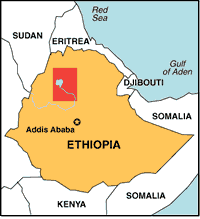 |
move cursor
over image
for local map |
Ethiopia contains Africa's largest mountain
complex, distinguished by a diversity of climatic conditions and
so of both natural and cultivated plant life. The majority of Ethiopia's
agriculturally suitable land is concentrated in the highlands and
over 80 per cent of Ethiopia's 50 million people live above 1500
metres. The mountains of Ethiopia can be viewed as the heartland
of the country. Indeed, African mountains and highlands tend to
be areas with more favourable ecological conditions than the often
drier lowlands. However, the mountain environment of Ethiopia is
rapidly becoming more marginal as a result of both drought and population
growth. Ethiopia's forests now cover a disturbingly small area of
the country and with such a high percentage of the population being
dependent on mountain farming, the implications of land degradation
are extremely serious.
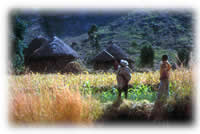 The
oral testimonies in the Ethiopia collection were collected in the
mountainous territory of Meket Woreda, an administrative district
of North Wollo in the northern highlands of Ethiopia, which is between
2,000 and 3,400 metres above sea level. Meket consists of a high
altitude plateau and the gorge of the Tekeze river to its north.
A good all-weather road, referred to as "the Chinese road", links
Woldiya, the capital of North Wollo, with Woreta, following the
line of the watershed on the plateau. There are several villages
and market centres along the road, otherwise the population is scattered
in small villages on the plateau, and on cultivated shelves within
the gorge. The
oral testimonies in the Ethiopia collection were collected in the
mountainous territory of Meket Woreda, an administrative district
of North Wollo in the northern highlands of Ethiopia, which is between
2,000 and 3,400 metres above sea level. Meket consists of a high
altitude plateau and the gorge of the Tekeze river to its north.
A good all-weather road, referred to as "the Chinese road", links
Woldiya, the capital of North Wollo, with Woreta, following the
line of the watershed on the plateau. There are several villages
and market centres along the road, otherwise the population is scattered
in small villages on the plateau, and on cultivated shelves within
the gorge.
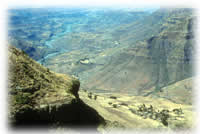 Like
the Mount Elgon region in Kenya, Wollo is relatively densely populated
and sustainability of agriculture is the key concern. The people
are almost entirely dependent on agriculture and herding, but over
the past two decades the land has become increasingly degraded and
food production is no longer secure - even in years of "good rainfall".
Although development agencies have been working with the people
to halt environmental decline and provide other developmental inputs,
most people remain extremely impoverished. Not surprisingly, the
tone of the testimonies is often anxious and concerned for the future,
if also proud of their heritage and identity. Like
the Mount Elgon region in Kenya, Wollo is relatively densely populated
and sustainability of agriculture is the key concern. The people
are almost entirely dependent on agriculture and herding, but over
the past two decades the land has become increasingly degraded and
food production is no longer secure - even in years of "good rainfall".
Although development agencies have been working with the people
to halt environmental decline and provide other developmental inputs,
most people remain extremely impoverished. Not surprisingly, the
tone of the testimonies is often anxious and concerned for the future,
if also proud of their heritage and identity.
the themes
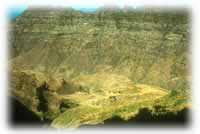 The
overriding preoccupation of the narrators of these testimonies is
the diminished productivity of the land. This is variously attributed
to poor rainfall, the small size of plots of land resulting from
redistribution under the Derg, and population growth. The testimonies
highlight the problem of people being unable to leave their fields
fallow to recover their fertility. In addition to creating fuel
problems, deforestation has meant that the numbers of wild animals
and livestock have been severely depleted. The great majority of
narrators talk of the hardship they experience, the sharp rise in
the cost of living and the need to sell livestock to pay for essential
goods. An allied theme is the near-disappearance of time-honoured
traditions of generous hospitality and of care of the old and disabled. The
overriding preoccupation of the narrators of these testimonies is
the diminished productivity of the land. This is variously attributed
to poor rainfall, the small size of plots of land resulting from
redistribution under the Derg, and population growth. The testimonies
highlight the problem of people being unable to leave their fields
fallow to recover their fertility. In addition to creating fuel
problems, deforestation has meant that the numbers of wild animals
and livestock have been severely depleted. The great majority of
narrators talk of the hardship they experience, the sharp rise in
the cost of living and the need to sell livestock to pay for essential
goods. An allied theme is the near-disappearance of time-honoured
traditions of generous hospitality and of care of the old and disabled.
Most people look to education, new development activities and training
in new skills as the best means of improving their families' and
community's prospects; some also emphasise the importance of birth
control to curb population growth. Positive changes mentioned by
many narrators are the improved status of women, better relations
between Christians and Muslims and other groups, better health facilities
and improved communications since the building of "the Chinese road".
However, many are also concerned that greater mobility has increased
the threat of AIDS.
the partners
Panos worked in partnership with SOS Sahel Ethiopia, which has
been working in Meket since 1992/93. The area is at high risk of
irreversible environmental degradation, and of seasonal food shortages
and famine. By linking farmers and research institutions, SOS Sahel
aims to assist the testing of technical options and strategies,
build up local institutional capacities, and integrate relief and
development work.
The testimonies were collected by field workers from SOS Sahel's
Wollo Agricultural Support Programme between December 1996 and October
1998. The aim was to strengthen the ability of fieldworkers to carry
out participatory research through oral testimony methodology. It
was also to create an opportunity for staff to gather, consider
and disseminate the views and experiences of local communities on
specific themes, including those relating to environmental degradation,
seasonal food shortages and famine.
SOS Sahel Ethiopia produced and disseminated an Amharic booklet
based on the testimonies for local and national audiences.
Through the earlier Sahel Oral History Project, over 500 interviews
were carried out in 8 countries across the Sahel, including Ethiopia.
Edited versions of some of these interviews are presented in the
Panos publication At the Desert's Edge: Oral histories from the
Sahel.
publications
|
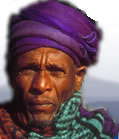



 The
oral testimonies in the Ethiopia collection were collected in the
mountainous territory of Meket Woreda, an administrative district
of North Wollo in the northern highlands of Ethiopia, which is between
2,000 and 3,400 metres above sea level. Meket consists of a high
altitude plateau and the gorge of the Tekeze river to its north.
A good all-weather road, referred to as "the Chinese road", links
Woldiya, the capital of North Wollo, with Woreta, following the
line of the watershed on the plateau. There are several villages
and market centres along the road, otherwise the population is scattered
in small villages on the plateau, and on cultivated shelves within
the gorge.
The
oral testimonies in the Ethiopia collection were collected in the
mountainous territory of Meket Woreda, an administrative district
of North Wollo in the northern highlands of Ethiopia, which is between
2,000 and 3,400 metres above sea level. Meket consists of a high
altitude plateau and the gorge of the Tekeze river to its north.
A good all-weather road, referred to as "the Chinese road", links
Woldiya, the capital of North Wollo, with Woreta, following the
line of the watershed on the plateau. There are several villages
and market centres along the road, otherwise the population is scattered
in small villages on the plateau, and on cultivated shelves within
the gorge. Like
the Mount Elgon region in Kenya, Wollo is relatively densely populated
and sustainability of agriculture is the key concern. The people
are almost entirely dependent on agriculture and herding, but over
the past two decades the land has become increasingly degraded and
food production is no longer secure - even in years of "good rainfall".
Although development agencies have been working with the people
to halt environmental decline and provide other developmental inputs,
most people remain extremely impoverished. Not surprisingly, the
tone of the testimonies is often anxious and concerned for the future,
if also proud of their heritage and identity.
Like
the Mount Elgon region in Kenya, Wollo is relatively densely populated
and sustainability of agriculture is the key concern. The people
are almost entirely dependent on agriculture and herding, but over
the past two decades the land has become increasingly degraded and
food production is no longer secure - even in years of "good rainfall".
Although development agencies have been working with the people
to halt environmental decline and provide other developmental inputs,
most people remain extremely impoverished. Not surprisingly, the
tone of the testimonies is often anxious and concerned for the future,
if also proud of their heritage and identity. The
overriding preoccupation of the narrators of these testimonies is
the diminished productivity of the land. This is variously attributed
to poor rainfall, the small size of plots of land resulting from
redistribution under the Derg, and population growth. The testimonies
highlight the problem of people being unable to leave their fields
fallow to recover their fertility. In addition to creating fuel
problems, deforestation has meant that the numbers of wild animals
and livestock have been severely depleted. The great majority of
narrators talk of the hardship they experience, the sharp rise in
the cost of living and the need to sell livestock to pay for essential
goods. An allied theme is the near-disappearance of time-honoured
traditions of generous hospitality and of care of the old and disabled.
The
overriding preoccupation of the narrators of these testimonies is
the diminished productivity of the land. This is variously attributed
to poor rainfall, the small size of plots of land resulting from
redistribution under the Derg, and population growth. The testimonies
highlight the problem of people being unable to leave their fields
fallow to recover their fertility. In addition to creating fuel
problems, deforestation has meant that the numbers of wild animals
and livestock have been severely depleted. The great majority of
narrators talk of the hardship they experience, the sharp rise in
the cost of living and the need to sell livestock to pay for essential
goods. An allied theme is the near-disappearance of time-honoured
traditions of generous hospitality and of care of the old and disabled.

